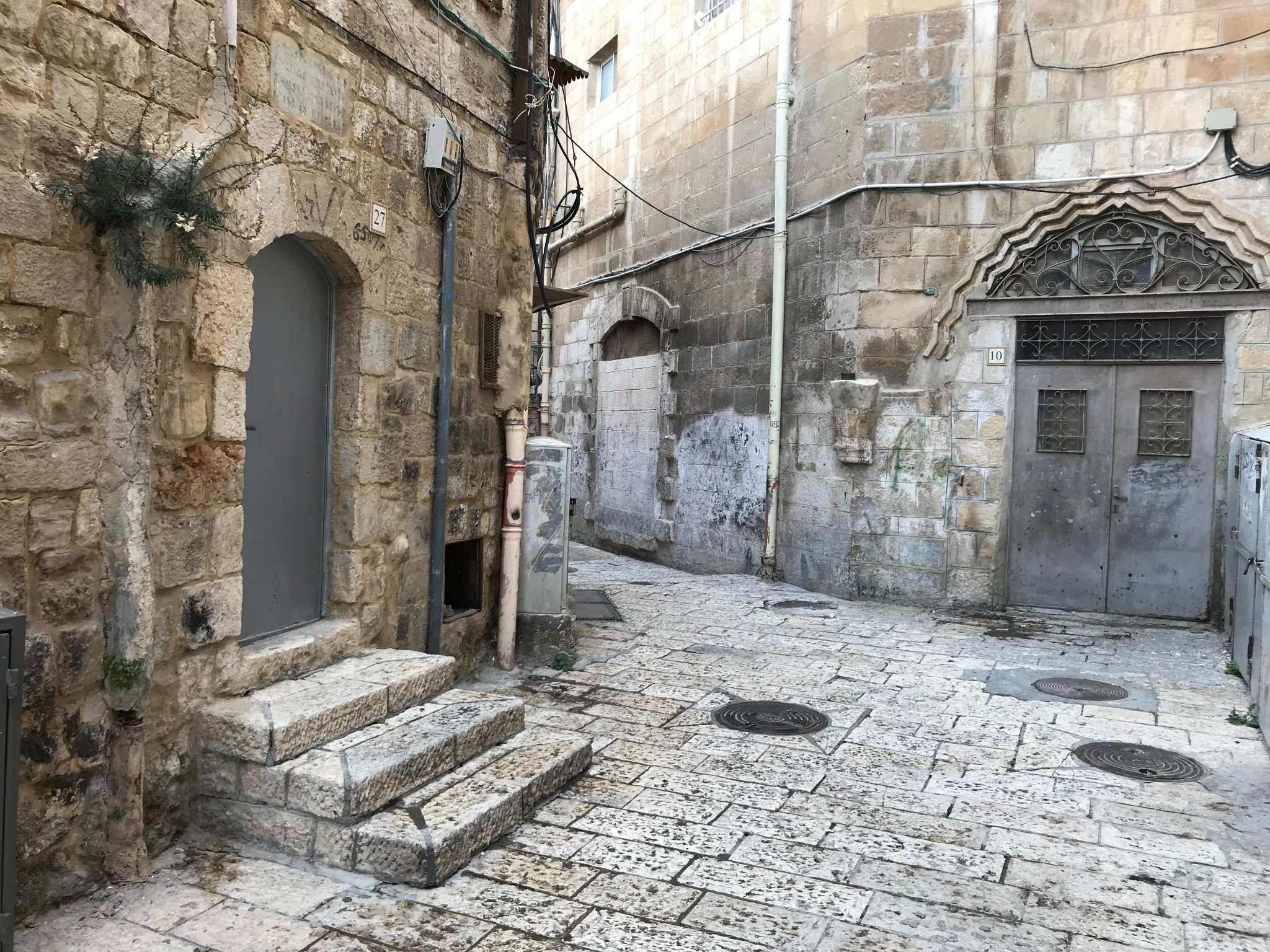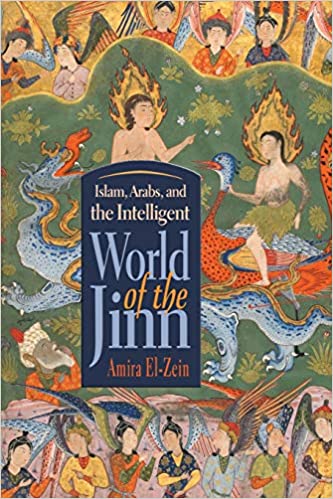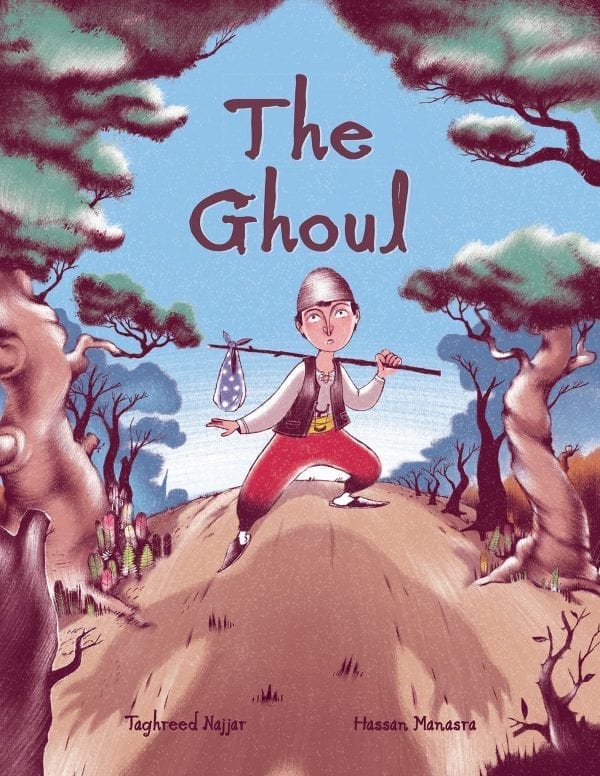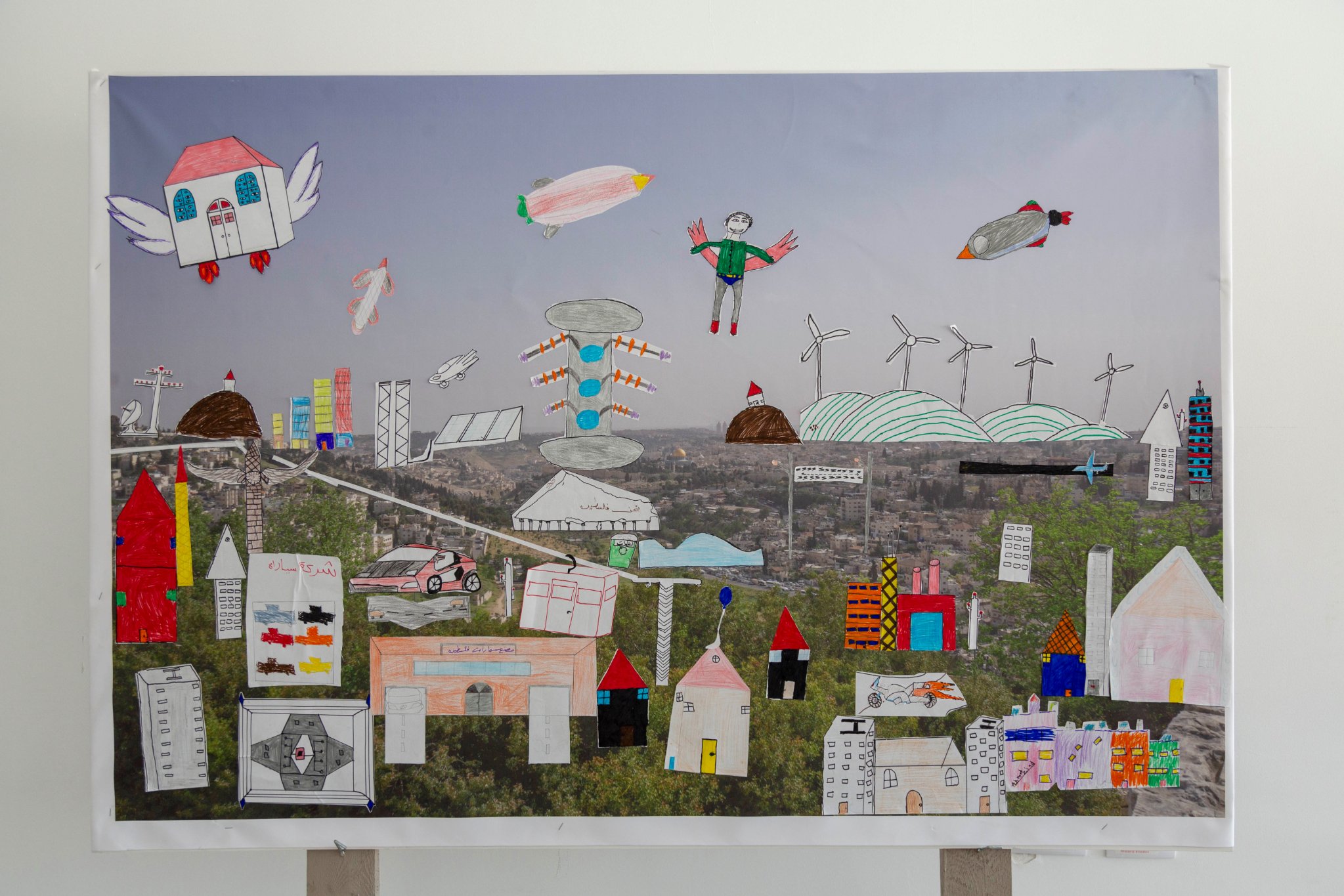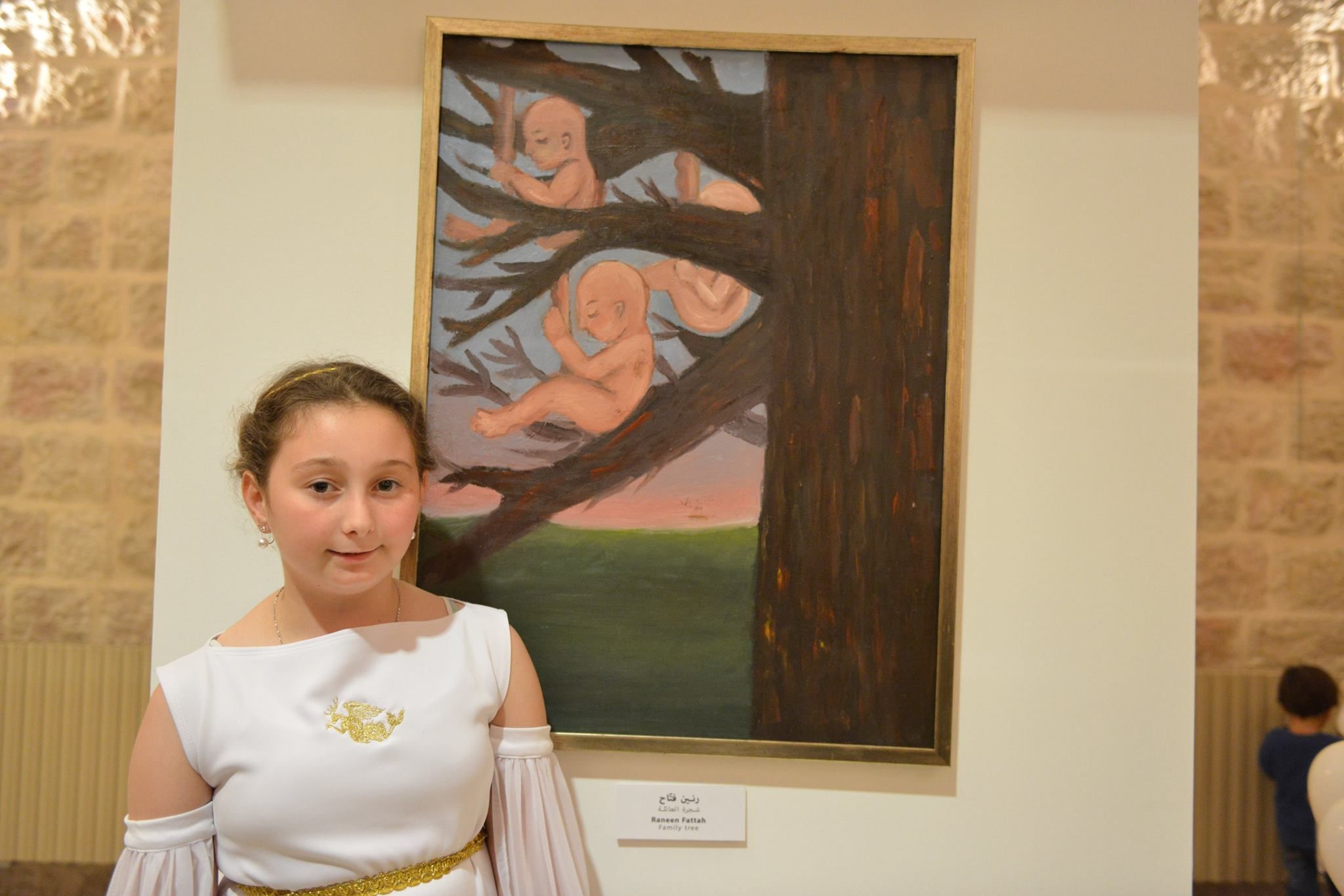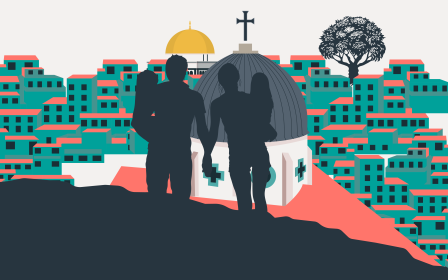Jerusalem supernatural: Meet the Palestinian man hunting ghouls, ghosts and jinn
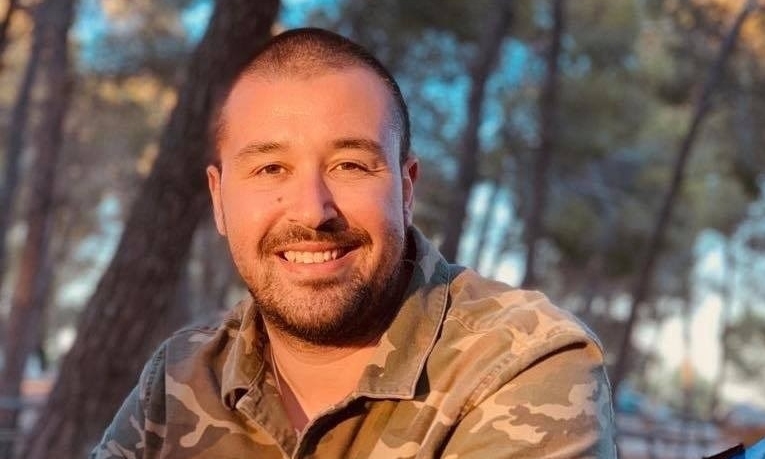
“Some say they are small figures. Some say they're a little bit chubby.”
“They wear white and you can't see their facial features because cone-like hats are covering everything but a little bit of the eyes,” says Ahmad Nabil, a Palestinian educator, researcher and artist, who collects folklore and stories about jinn - supernatural, spiritual beings rooted in Arab and Muslim culture.
Nabil wanders Jerusalem's Old City and speaks with Palestinian shop owners and residents about their memories of supernatural moments: the startling glimpse of a ghost, visits by Jerusalem’s “righteous” jinn (the virtuous spirits), folk tales and half-forgotten moments that have taken on supernatural lives of their own.
One recent story that Nabil collected was the reminiscence of an older man: “He's a very intellectual man and he told me that when he was about eight years old, he wanted to go outside and play. The moment he opened the door he saw three white figures with some sort of a white cape. They were faceless and he could not see their features. They were floating and did not have hands.
New MEE newsletter: Jerusalem Dispatch
Sign up to get the latest insights and analysis on Israel-Palestine, alongside Turkey Unpacked and other MEE newsletters
“He was petrified, but they put him into a trance that took the fear out of him. On another occasion, he saw one of them taking his six-month-old baby brother out of the house. The next day, his baby brother died.
During the recent renovation of his house, which Nabil believes is from the Mamluki era [of the 13th-16th century Mamluk sultanate], the man discovered a cave beneath it, with three tombs. Even though there was no written evidence, some say they are "righteous people" who were buried in such a cave underground.
The topic of jinn is very sensitive in the Old City of Jerusalem, Nabil tells Middle East Eye: "People do not want to be [judged] or thought of as just fabricating the stories, so they have to trust you first to tell you these stories. They have to trust that you believe them.
'Jerusalem is a very contested space… Folklore collection is a very important aspect of identity-building and history-making'
- Dr Jorg Matthias Determann, historian
“The Old City of Jerusalem in the 1940s and 50s, and even before, was swamped with magical stories and traditions. Many people describe jinn that live among the population of the Old City and are well known in the Old City. There are the jinn that perform wudu [prayer ablutions] at dawn, jinn that bring warnings, and jinn that offer consolation.”
Dr Jorg Matthias Determann, historian and author of Islam, Science Fiction and Extraterrestrial Life, explains the difference between folk tales, which may be based on entirely mythical beings, and jinn stories told by ordinary inhabitants of Jerusalem.
“The jinn are part of the Quran and this is something that cannot be underestimated,” Determann tells MEE.
“They're not just in the Quran; there's an entire chapter named after the jinn. What that means is that if you are a Muslim and if you believe in the Quran and if you believe that the Quran is the word of God, that means you have to believe in jinn. That puts jinn on a different level than, let's say, ghosts of western gothic literature.”
'Intermediary beings'
The Arabic word "jinn" can also apply to supernatural occurrences in pre-Islamic legends, says Nabil, adding that we discover signs of this heritage in the most ordinary of places.
“For example, we call the telephone al-hatif [the Arabic word for ‘the caller’]. Hatif [can also mean] the jinn that is calling you while you don't see it - a disembodied voice. So, basically, the word for telephone means you hear somebody but you don't see him or her.”
Unlike the Quran, jinn stories are not present in the Bible. While Christian Palestinians may use Arabic terminology such as “ghoul” to describe spirits, in most conversations about the supernatural in the Christian community, Nabil says, there is more of an emphasis on good and evil spirits versus details about jinn who live among people and who have idiosyncratic behaviours.
“Jerusalem is a very contested space. This is also a space where you have a lot of people trying to sustain a certain identity," Determann adds.
"There are churches and mosques and synagogues in Jerusalem, and they're sort of competing over the same space. Folklore collection is a very important aspect of identity-building and history-making,” says Determann, whose German literary heritage includes the Brothers Grimm, two of the great German folk tale collectors.
He explains that the Grimm stories emerged at a time when German lands were politically fragmented. "All these different principalities faced a strong, dominant French culture. The Brothers Grimm were trying to unite German culture and create a German identity based on a common culture.”
Jinn tales exist in all parts of the Arab and Islamic world. In her book Islam, Arabs, and the Intelligent World of the Jinn, Doha-based Georgetown University professor Amira el-Zein confirms that jinn folklore can be traced back to pre-Islamic Arabia: “The worship of the jinn is […] attested to in Arab Safaitic inscriptions from northern Arabia. The Arabs […] brought these deities with them when the Syrian steppe was Arabised as a result of Arab invasions during the second half of the first millennium.”
El-Zein describes jinn as “intermediary beings” that are “complex, multifarious, intricate and hesitant between obscurity and glow”.
“They are go-between beings,” she writes. “Like humans, they could at any time shift towards goodness or towards evil.”
And sometimes the jinn can cause us problems without doing anything to us at all. Nabil describes a story he recently heard.
“In the Old City, there was a custom of leaving a basin of water outside the door at night," he says. "There was [talk] in the Old City about righteous jinn making wudu at dawn, so a resident would fill a pot with water and place it outside in order for jinn to come and do wudu at dawn.
“One person told me that when he was a kid, he woke up early and needed to use the bathroom. They had one bathroom for the whole building. Different families lived in one compound with one bathroom. So the kid needed to go, but his mother prevented him because she could hear the righteous jinn doing wudu, so he had to wait, and he messed himself.”
Tales of the troublesome jinn
The jinn also have their share of troublemakers, and Nabil is intent on finding more stories of mischievous jinn. His project, The Road of Ghouls (since ghouls are typically considered the malevolent, flesh-eating jinn, often associated with cemeteries), explores the folklore of these supernatural beings in existing Palestinian villages and villages destroyed by Israel.
Nabil started his research focused on Islamic and Arab mythical creatures in 2015, which led him to explore local Palestinian superstitions. He began to examine more of the Palestinian and Arab folk superstitious stories and beliefs. His Road of Ghouls project started in 2019 and the first field trip was in early 2020, to Rahat in the Negev desert.
“It is common knowledge in Palestine that every village has a ghoul," says Nabil. “I’m trying personally to document the names of ghouls in Palestine, from south to north. I’m walking through the villages and the cities and I’m trying to document their characteristics.
"I try to link them with what was said in the old Arabic manuscripts such as The Book of Animals by Al-Jahiz and The Wonders of Creation by Zakariya al-Qazwini. I want to create an encyclopaedia so that whenever anybody asks us: do you actually have supernatural creatures? I can say: ‘Aha, we have an encyclopaedia!'”
Villagers describe unique characteristics that pertain to their own region’s ghouls because, Nabil says, the topography varies: “Some villages are close to the coast, some are in the middle of the deserts.
"The challenges that village inhabitants experienced in their environments led to different kinds of fears, so I’ve noticed the behaviour and appearance of ghouls vary from one village to another."
Nabil notes that British and later western popular culture borrowed the concepts of ghouls and zombies from the Arabian ghoul.
“There are the western stories of ghouls that are grave diggers and they dig out bodies and they eat them," Nabil says, "so basically this is a modification on the ghoul’s character.”
This echoes Professor Ahmed al-Rawi's research, which demonstrated that “when Antoine Galland translated One Thousand and One Nights into French in the 18th century, some features were added to the ghoul in order to intensify its fearful characteristics”.
Inspired by the previously translated One Thousand and One Nights, and published in 1786, William Beckford’s novel Vathek was the first western novel to mention “goules”.
The Fiction Council
When he is not collecting fantasy tales and folk memories, Nabil directs the Fiction Council, a non-profit organisation he developed to inspire Palestinian youths’ creative imaginations, especially in fantasy and science fiction.
It is a way to help children imagine their own future apart from the oppressive conditions of Israel's occupation of Palestine and the traditional aspects of Palestinian society.
His inspiration for the Fiction Council comes from his own childhood experiences.
“I’ve been drawing monsters since I was eight or nine and I’ve been hanging these monsters on my closet,” he says. “People asked: 'Why don't you draw flowers and you know, jars and nature?’ Sure, those are cool but they weren’t me.”
A Palestinian born in Kuwait in 1988, Nabil studied applied arts and design in Jordan before returning to Palestine to found the non-profit Fiction Council. His special interest is in the field of Arab mythology and folk tales, especially bestiary and mythical creatures, related to land, sea “and what lies between”.
He also recognises how western popular culture impacted him in his youth.
“Since I was a little boy, I was creating or inventing my own worlds, my own creatures, my own characters," he says. "I used to name them something westernised. I thought I wouldn’t get much attention unless I named it something western.
“So, when I grew up and realised our own heritage, I decided that I’m never using western names for my characters. I always try to give them a little bit of eastern flavour.”
Mockery and bullying
For Nabil, the importance of supporting creativity and imagination for Palestinians, especially youth, comes from his own experiences.
He recalls the mockery and bullying of his own youth. “There is a specific part of the community that doesn't like change," he says. "They don't like new ideas because when they were young, they were told that imaginative ideas are some sort of stupidity.”
'We have kids that are interested in black holes. They have these crazy theories about building new futures that basic curriculums in schools wouldn't allow'
- Ahmad Nabil, Palestinian artist and educator
But besides a reluctance to accept new ideas by some, there are also other pressures on Palestinians in Jerusalem and the rest of Palestine due to the Israeli occupation and hegemony over Palestinian lands.
“People want a normal life,” he says. “They think: 'Crazy ideas and fanciful minds. This is the last thing we need. We need a normal life.’”
A normal life, says Nabil, means “I wake up. I go to work. I gain an income. I come back. I enjoy some time with my family. I sleep and then there's a loop and I wait for weekends and we go enjoy our lives.”
But for some children, there is more to life.
“We have kids that are interested in black holes. They have these crazy theories about building new futures that basic curriculums in schools wouldn't allow," he says. "So this is where the Fiction Council steps in and says, ‘someone tells you that your child is crazy? Well, at the Fiction Council we love that.’”
In 2019, Nabil developed an interactive science fiction workshop for students aged between 12 and 15 from various rural West Bank Palestinian villages. He asked them to imagine the influence of technology on their homeland in 200-300 years' time.
“I’ve always loved art throughout my life,” says Raneen, a 14-year-old participant on a Fiction Council workshop. “The Fiction Council had not only opened new doors to my life but has opened my eyes to true imagination in this world.”
To help provide a place for Palestinian youth to use their imaginations, Nabil is currently renovating his grandfather's house in Beit Safafa in East Jerusalem to use as a base for the Fiction Council.
When he first told people he was developing a place for imaginative ideas, he was mocked.
However, those familiar with his work as a researcher of folklore and as an educator respect his efforts.
“Many of us as residents of the city have heard some of those stories from our families, but they remained as small thoughts that we tell friends sometimes in our conversations," says journalist and producer Sabreen Taha, who lives in Jerusalem. "But we never really had the chance to dig deeper or connect them to the history of the city.
“Those stories are truly part of our lives in the city and it didn't matter that much before, at least for me, before meeting Ahmad and talking to him. I believe this documentation of those tales helps revive our memories and helps us know ourselves and our city even better.”
Currently, one of the Fiction Council's main challenges is to overcome Israel’s limitations on Palestinian capacity for life and prosperity. Recent violence towards Palestinians in East Jerusalem and other parts of Palestine have continued to disrupt that capacity.
"Palestinians must unite, follow, focus, share and support, physically and virtually, but this can be energy-draining and leaves no place for imagination," says Nabil, who is hoping to facilitate an art exhibition in the near future.
"I care about my people and I care about my heritage… We have the potential for marvellous thinking. It's time to uncover the fantastical, imaginative character and heritage of the Palestinian community, whether it’s in Jerusalem or in Palestine in general.”
This article is available in French on Middle East Eye French edition.
Middle East Eye delivers independent and unrivalled coverage and analysis of the Middle East, North Africa and beyond. To learn more about republishing this content and the associated fees, please fill out this form. More about MEE can be found here.


